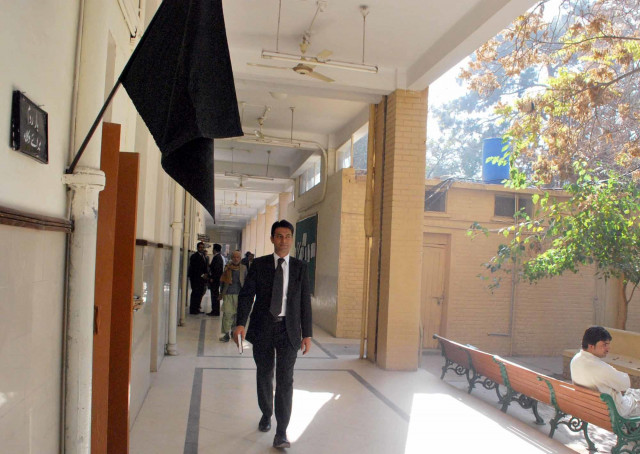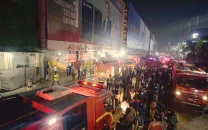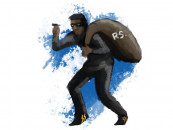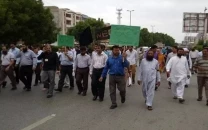Lawyers across Karachi observe black day
Legal fraternity marked the 10th year of the November 3 emergency

PHOTO: NASEEM JAMES/FILE
The legal fraternity had launched a movement for the independence of the judiciary and restoration of the judges sacked by General Musharraf along with then chief justice Iftikhar Muhammad Chaudhry on March 9, 2007.
This struggle, which was later joined by civil society and supported by the media, had further accelerated after the imposition of emergency - the second coup by General Musharraf after October 11, 1999.
The legal fraternity observes a black day on November 3 every year.
The Sindh High Court (SHC), the City Courts and District Malir Courts wore a deserted look as lawyers did not turn up to plead their cases fixed for the day in the superior and subordinate courts and special tribunals across the city.
Musharraf’s Coup: PML-N marks Oct 12 as ‘Black Day’
Earlier in the day, SHC Chief Justice Ahmed Ali M Sheikh suspended judicial work at the courts across the province on the request of the SHC Bar Association (SHCBA).
A general body meeting of the association, presided over by its secretary Advocate Shahab Sarki, was held at the Iftikhar Hall - the body's office named after the country's top judge for his struggle against dictatorship.
A resolution unanimously adopted by the members said the SHCBA along with the entire legal community had always fought for the rule of law and independence of judiciary in Pakistan, adding that it was the joint struggle of the lawyers' community, civil society, media personnel and all other political activists that resulted in the restoration of the judges and civilian rule in Pakistan.
The association stated that unless corruption and incompetency were eradicated from the judiciary its independence cannot be fully secured. Therefore, the members resolved that it extends its appreciation to all judges, lawyers, journalists, political activists and members of civil society who bravely resisted extra-constitutional measures and rendered great sacrifices to ensure the return of democracy and an independent judiciary in the country.
Legal fraternity condemns hooliganism of lawyers
They also reiterated their commitment to maintain the independence of the bar and contribute to the struggle for an independent judiciary and strengthening of constitutionalism and rule of law in Pakistan.
Similarly, general body meetings were also held by members of the Karachi Bar Association and the Malir District Bar Association.
Litigants and under-trial prisoners faced difficulties due to the suspension of work in the courts. Hundreds of cases fixed in the courts for the day had to be adjourned without hearing. However, judges remained in their chambers to take up urgent matters.



















COMMENTS
Comments are moderated and generally will be posted if they are on-topic and not abusive.
For more information, please see our Comments FAQ